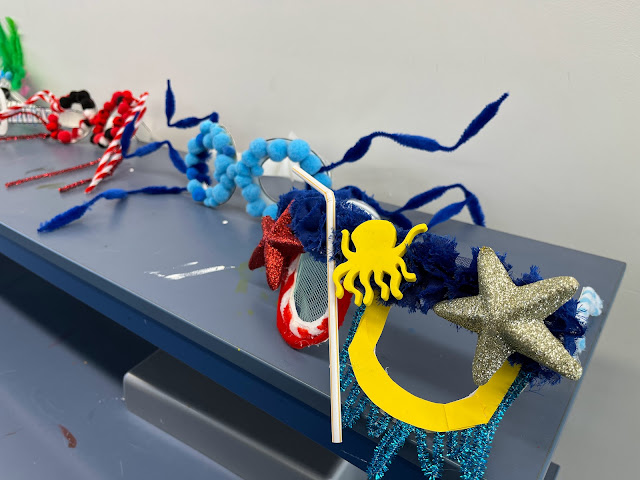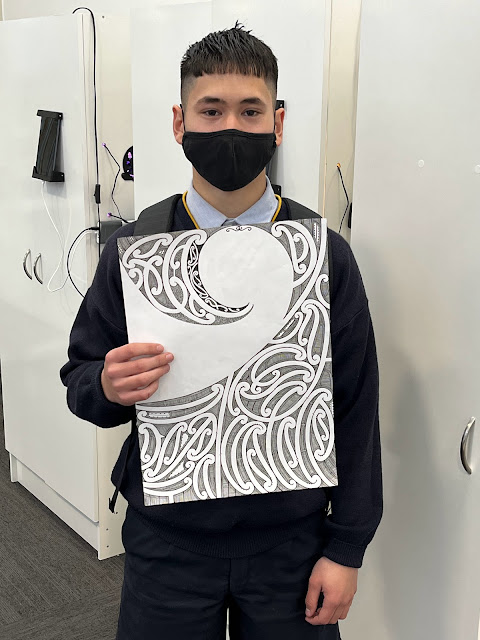As a leader, what do you stand for? There's an old saying: if you stand for nothing, you'll fall for anything, and I am of a mind to agree with that.
This sign above our main reception tells you something about not only what I stand for, but also what our kura stands for:
As a leader though it's important to make sure that those around you understand what you stand for. If they are unclear, the outcome seems highly likely to be a state of confusion.
I have tried really hard to make sure that those I work with know what I stand for, and I'd like to think that if you ask them, then most of them would include in their answers some sort of statement about the power of creativity in education.
I've written before about how our actions are more important than our words in sending those signals about what we value, and in that context I described my own poetry writing, and its sharing with staff, as a way of modelling creativity and personal risk taking.
But wait, there's more.
In 2017 I started the habit of giving every staff member a book gift: 'Creative Schools' by Sir Ken Robinson. I want staff to understand what creative schools might be, and why I think it's important. The difficulty (as others have said) with Sir Ken's work is that it doesn't exactly create a 'how to' manual. Rather it (very persuasively) argues the case for creativity in schools.
Earlier this year I discovered the 1950's work of Elwyn Richardson after buying and reading his book 'In the early years' (on the recommendation of Bruce Hammond .. kia ora, e hoa). I followed this, on recommendation, with the book 'Elwyn Richardson and the early world of creative education in New Zealand' by Margaret MacDonald. These are both NZCER publications, and they both mightily impressed me.
In line with my habit with Sir Ken's book, I wanted to give every staff member a copy of MacDonald's book, so outstanding do I think it is. However, our school budget certainly wasn't going to run to that, so I emailed Graeme Cosslett, Tumuaki of NZCER. I headed the email 'A challenging request of NZCER', described our work, and then said I wanted him to give me enough copies of MacDonald's book to give every staff member and Board member a copy. If you don't ask, you don't get.
The initial response was warm and empathetic, but Graeme was unsure if they could manage this, after all my request was not cheap. However after internal discussion, particularly with NZCER Publications Manager David Ellis, I received a reply from Graeme that made that ten year old boy inside me (yes, there is still one) jump up and down with joy. Perhaps just as heartening was this comment in his email:
We both admire your courage to ask, and whilst this certainly isn't something we can do on a regular basis, the work you are leading at Te Huruhuru Ao o Horomaka is strongly aligned with NZCER's own strategic priorities - particularly our goal around improving equity for ākonga and equity in education. One of our goals in this strategic priority is to work with diverse and under-served groups to find ways for all ākonga strengths to be revealed and supported through our mahi. Via Elwyn's book, and your own kaiako - we have no doubt the creative strengths of ākonga in your school will continue to be revealed and supported in the great work you are doing
Today I gave staff copies of the book. The response was heartening. We couldn't resist the photo opp, although many of the support staff team were not present (yes, EVERYONE on our staff team got a copy).
 |
| Some of our staff with the newly arrived books |
In the midst of this our Head of Maths announced over the weekend that we are celebrating maths week with 'cre8ive maths'. Oh wow!!! My contribution has been to promise a maths based limerick a day.
This was the first one:
But more importantly students are getting stuck in to creative maths challenges, and we'll publish some of their work at the end of the week.
This is all another manifestation of the 'Create' component of our Manaiakalani 'Learn Create Share' pedagogy. This is what it could look like, this is an insight into yet more ways of manifesting that pedagogy in a kura.
I'm serious about this stuff. I'm serious about the power of creativity. I believe the evidence, so succinctly captured by Professor Peter O'Connor and his co-authors from the University of Auckland Centre for the Arts and Social Transformation in their 2020 paper "Replanting Creativity during post-normal times'. Creativity is a great vehicle for improving engagement, approaching learning with a creativity lens improves learning outcomes and wellbeing.
I'm pretty excited about staff response to the gift of this book (made possible by Graeme and his team), and will be keen to see where they take what they read. I have no idea, and that is one of many things that makes this so exciting. If our rangatahi are more engaged, if they improve their own learning outcomes, if they are happier at school, this will have been an outstanding investment by NZCER.
Special thanks to Graeme, David, and the team at NZCER. Tino pai to mahi!!! Thank your for your faith in and validation of our mahi, and your support. We fully understand that this is not something you are able to do for every school.


























